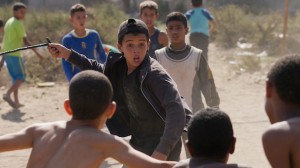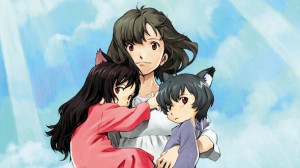In the third year of the Great Patriotic War a nameless boy and his sick mother make their way back to their home in Ukraine. The train they travel on rumbles like artillery fire, a fellow passenger curses, “We will suffocate in here like a gas chamber.” The boy’s story is just one in a disparate sea of millions as humanity washes back to shore, the Nazi dam ruptured under the weight of Stalingrad, Kursk and the annihilation of Army Group Centre.
The boy is vulnerably stoic, junior driftwood floating through an adult world. He’s clumsy always knocking into things or people, dropping his hat or forgetting his possessions. He inhabits a surreal landscape of miss firing tannoys, stomping boots, and tea sets in the snow. Adults help and adults hinder as he ranges from one vignette to another, poetic reportage that can only hint at the horrors he fled at the start of the war. They are locked behind his eyes, bolted up in his being as he stands vigil over his mother or in line waiting for a telegram to be written.
Based upon Friedrich Gorenstein’s semi-autobiographical story of the sane name, “The House with a Turret” is a mesmerising passage into the dreadful. Shot in dreamy black-and-white, the lyrical photography immerses the audience both in place and memory, as if historically accurate from a child’s recollection. The frame is filled with one armed veterans, fat Communist party wives, humourless officials and dour but caring nurses. This is “Empire of the Sun” without the Mustang and when after the boy hears terrible news he comments, “I’ll have to go further now” your heart flies out to him. When you discover an orphan plays the boy the tragedy is unbearable.
On the outskirts of Casablanca in the slums of Sidi Moumen more children prepare to lose their innocence. Brothers Yachine and Hamid play football, hustle engine parts and fight rival gangs with their friends. Their mother idolises Hamid as she watches her soaps flanked by their disturbed father and lazy older brother Said. Yachine dreams of becoming a famous goalkeeper whereas Hamid runs errands for the older drug-dealers his path set for squalid riches and self-destruction. Both Yachine and Hamid alongside their childhood friends will become suicide bombers on May 16th 2003.
They are “The Horses of God”–divine retribution unleashed from the guile and cunning of men capable of intricate and cruel manipulation. However we are shown the seeds of discontent long before the radicalising clerics surface. The poverty is crushing, the police violent and corrupt. When a new factory is built nearby the workers are bussed in from other areas rather than employed from the desperate locals. As young men in the late 90s Hamid is imprisoned and without his guardian angel to protect him Yachine is literally squeezed out of his orange selling business. When the 9/11 attacks happen and the canvassers proclaim, “Supporting Al-Qaeda is a religious duty” both brothers begin to listen.
“The Horses of God” is no simplistic study of extremism but deft a coming of age story complicated by urban poverty, sibling rivalry, self-doubt, misplaced trust and burning anger. The film is at its strongest when the brothers ever so slowly divorce themselves from their family and friends and finally from each other under the watchful gaze of Emir Abou Zoubeir. His whispering campaign of radicalisation is fascinating as it is repellent a master class in propaganda that leaves his victims with a chilling question, “Will we be martyrs if we kill Muslims?” Sadly a question left to be answered after their barbaric deed that killed 45 including 12 suicide bombers on that fateful day in 2003.
At the beginning of “Wolf Children” our narrator Yuki disarms the audience by saying, “Maybe you’ll laugh and say it’s a fairy tale but it is a true story about my mother.” Yuki’s words help suspend our disbelief fully so we are not watching a shaggy dog anime about half-wolf, half-human children, but a contemplative film about motherhood. Yuki and her brother Ame are the children of Hana and the mysterious wolf-man she falls in love with at Tokyo University. Realising they are different she moves her family to a remote mountain retreat to raise them away from prying eyes.
Director Mamoru Hosoda has created a story that could come from ancient Japanese folklore but is really the product of his adulation to friends of his who had recently become parents. The old clichés about raising kids are all present but when coupled with a lycanthropic twist, the audience begins to question how closely at times we align children to animals, or even treat the former worse. Hana hasn’t got all the answers and her former partner was enigmatic to say the least so when she asks, “How do wolf children grow up?” she is contemplating the same question every new parent agonises over.


